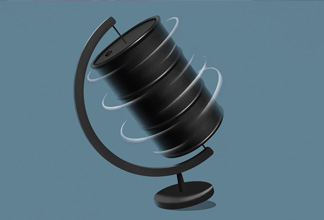Dear Money, It's Not You, It's Me
Written by Melissa Leong, author of Happy Go Money
Published on January 30, 2020
minute read
Share:
Several years ago, my husband and I had a, well, heated discussion about our finances, and it transformed the way I viewed money. He accused me of being cheap, whereas I saw myself as being responsible.
“Why are you so reluctant to spend, even on things such as investing in your business?" he asked. I realized that my mentality around money was that it's a finite resource you toil for and then safeguard. I was hesitant to part with cash — but I was also missing out on opportunities. So, for the first and only time in our lives, I conceded that my husband might be right. I needed to be more open to letting my money work for me.
How we feel about money can affect how we save, spend, borrow and invest. In order to be more successful with your finances, start by re-evaluating your relationship with money.
Identify the relationship
Explore your feelings about money. Are they positive or negative? How do you talk about money? How do you feel when the topic comes up? Are you comfortable or stressed?These things you automatically think, say and feel about finances are your money scripts. And your scripts are not always helpful or even accurate.
Look into the origin of your money scripts. Money meaning generally grows on family trees. In other words, the way we approach finances is often something that we learned when we were young. For example, how did your family talk about money? (“We'll be happier when we have more in the bank." “Your uncle is successful because he's rich." “Wealthy people are jerks.") Did your parents manage their finances well, or were they constantly late paying their bills?
That being said, some of our behaviour around money is innate. Research has shown that some people are predisposed to being spenders or tightwads; when it comes to spending, they experience activity in the pain-processing centre in the brain differently. Interestingly, according to a 2009 University of Michigan study, misers and spendthrifts tend to be attracted to each other (my marriage is a good case in point).
Look at beliefs and behaviours
It's up to us to figure out whether our relationship with money is healthy and to create one that satisfies our needs and helps to achieve our goals. Take a good, hard look at how you are using money. Examine your bank and credit card statements. What are you spending on? When it comes to your discretionary spending — expenses that are non-essential, like dinners out and vacations — are these items in line with your values? Look at your last three unplanned purchases and think about the reasons why you made them. For example, if you have a habit of shopping to relieve stress, are your purchases actually improving your well-being or leading to more stress?
You can apply the same scrutiny to your investments. Your emotions play a huge part in how successful you are at investing. Keeping a portfolio journal can help — it's as simple as writing down how you feel about each investment decision. When you bought or sold a product, were you reacting out of fear? Do you regret your choices? This self-awareness is the jumping-off point to meaningful change.
Make a new strategy
Creating a plan for your money sets the ground rules for a fresh approach. Identify your short-term and long-term goals (ones that take more than five years to achieve). Break them down into mini, bite-sized goals that you can tackle immediately.
One smart strategy can be to set up an automatic withdrawal of funds, so that money is transferred out of your account, maybe each payday, into a separate account. Take care of your money priorities first, whether that's creating financial freedom in retirement, supporting your children through post-secondary education or bulking up your emergency fund.
Then, make a budget to enjoy life — identify what you value most and spend your money that way. If you need support with figuring out what's right for you, find a trusted professional who can help you build a financial plan.
By examining your money habits and money scripts and then developing a strategy, you can create a new relationship with money — one that will help you live the life that you want. Since that conversation with my husband, I've tried to take a more balanced view of my finances. I know that I've set funds aside for my priorities, so I am freer to take risks, splurge on experiences, treat friends and generally enjoy my money.
What is your money personality?Some financial experts say that people are born with certain money tendencies. Understanding yours is key to your financial health. Here are four common money personalities (you may identify with more than one): • Savers take pleasure in saving, possibly even hoarding, their money. They look for discounts, follow budgets closely and feel a lot of discomfort when parting with cash. • Spenders enjoy spending money. They're likely to splurge or make impulse buys. They're often generous to others, giving gifts and buying meals, even if it means adding to their debt loads. • Risk takers are gamblers. They often take significant risks with their investments — without doing sufficient research — and chase returns with fervour. • Avoiders (also known as ostriches) stick their heads in the sand when it comes to money. They'd rather not talk about it, or they find it stressful or overwhelming. |
Check out the Money Moves podcast, where Melissa Leong guides smart finance conversations. Brought to you by the Globe and Mail and RBC Direct Investing.
This article was featured in our special issue, as seen in the Globe and Mail. Download the full magazine HERE.
RBC Direct Investing Inc. and Royal Bank of Canada are separate corporate entities which are affiliated. RBC Direct Investing Inc. is a wholly owned subsidiary of Royal Bank of Canada and is a Member of the Canadian Investment Regulatory Organization and the Canadian Investor Protection Fund. Royal Bank of Canada and certain of its issuers are related to RBC Direct Investing Inc. RBC Direct Investing Inc. does not provide investment advice or recommendations regarding the purchase or sale of any securities. Investors are responsible for their own investment decisions. RBC Direct Investing is a business name used by RBC Direct Investing Inc. ® / ™ Trademark(s) of Royal Bank of Canada. RBC and Royal Bank are registered trademarks of Royal Bank of Canada. Used under licence.
© Royal Bank of Canada 2025.
Any information, opinions or views provided in this document, including hyperlinks to the RBC Direct Investing Inc. website or the websites of its affiliates or third parties, are for your general information only, and are not intended to provide legal, investment, financial, accounting, tax or other professional advice. While information presented is believed to be factual and current, its accuracy is not guaranteed and it should not be regarded as a complete analysis of the subjects discussed. All expressions of opinion reflect the judgment of the author(s) as of the date of publication and are subject to change. No endorsement of any third parties or their advice, opinions, information, products or services is expressly given or implied by RBC Direct Investing Inc. or its affiliates. You should consult with your advisor before taking any action based upon the information contained in this document.
Furthermore, the products, services and securities referred to in this publication are only available in Canada and other jurisdictions where they may be legally offered for sale. Information available on the RBC Direct Investing website is intended for access by residents of Canada only, and should not be accessed from any jurisdiction outside Canada.
Explore More

The Hidden Costs of Being Single
How single Canadians can build wealth on their own terms
minute read

What Investors Can Learn from Hockey Star and RBC Olympian Sarah Nurse
Nurse's path to the podium reveals how preparation, planning and practice can turn potential into a golden opportunity
minute read

Crude Questions? A Look at Canada’s Oil Economy
What you need to know about Canada’s oil industry
minute read
Inspired Investor brings you personal stories, timely information and expert insights to empower your investment decisions. Visit About Us to find out more.







